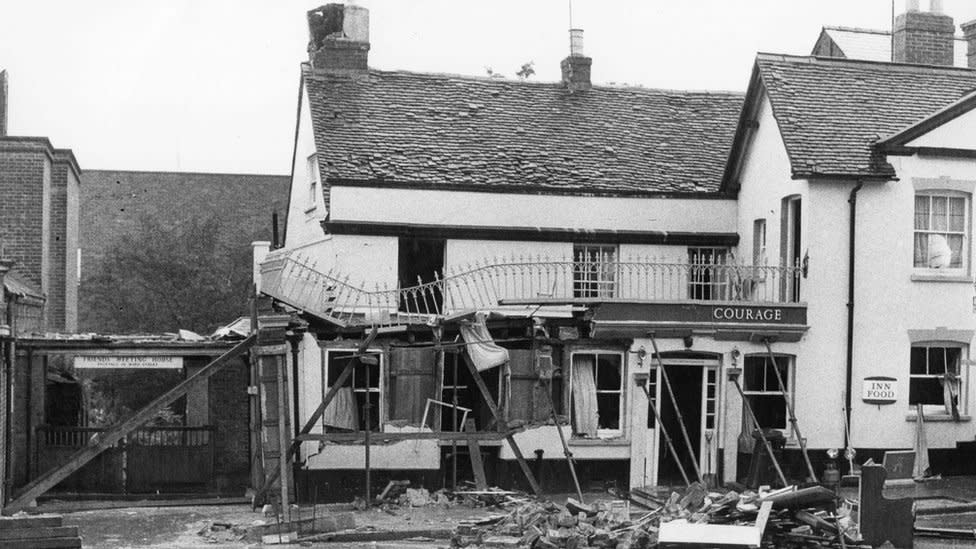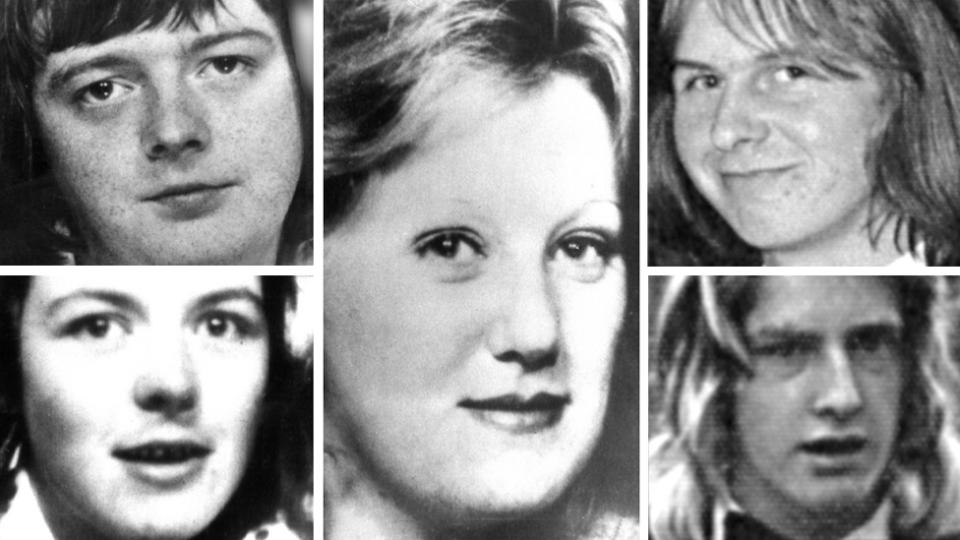Guildford pub bombings: New evidence 50 years after IRA attack

New evidence on the Guildford pub bombings has emerged 50 years after the IRA detonated two devices in the town.
Surrey Police told a family of one of the five people killed in the attack that the next step "would be a new criminal investigation", lawyers said.
But officers will not launch an inquiry before a new law comes in that would help shield perpetrators, they added.
Police said they remained committed to facilitating justice for the families of those who were killed.
KRW Law said a post-inquest assessment had, according to Surrey Police, "identified a potential forensic line of enquiry and the next step would be a new criminal investigation".
However, the firm said Surrey Police had stated it was not advancing any further investigations before the commencement of the Northern Ireland Legacy Act on 1 May. The act allows those involved with The Troubles to seek immunity from prosecution.
Four soldiers and a civilian died in the blast in Guildford's Horse and Groom pub in October 1974.
Another bomb detonated 30 minutes later at the Seven Stars.
The Guildford Four and Maguire Seven were wrongly-convicted for the attacks in one of the UK's biggest miscarriages of justice.
An IRA terror cell later claimed responsibility.
Those who died were 21-year-old civilian Paul Craig and soldiers Ann Hamilton, 19, Caroline Slater, 18, William Forsyth, 18, and John Hunter, 17. Sixty-five people were injured.

Cassandra Hamilton, Ann's sister, told the BBC: "[The police] said that there was a new piece of evidence that needed to be analysed forensically."
But she said police didn't think they could get the evidence analysed before 1 May.
She said police wrote to the Home Secretary in October but did not get a response until January.
She said: "If they had this evidence in October, then October to May is seven months. If they sent the letter in October, then obviously they had the evidence before that."

Ms Hamilton added that the family did not know what the evidence was - whether it was a fingerprint, or DNA, or anything else.
"We need answers for my sister," she said.
KRW solicitor Barry O'Donnell said: "The timing by Surrey Police in this matter raises too many questions."
He said there were questions over the nature of this "new" lead, over how long this new evidence has been available to Surrey Police and when decisions were taken not to investigate this "new" forensic evidence, and whether Surrey Police should and could continue its investigation.
According to KRW, police told the family the new lead was something the Independent Commission for Reconciliation and Information Recovery (ICRIR) could possibly advance after 1 May.
'Unfortunate timing'
Surrey Police Deputy Chief Constable Nev Kemp said: "Since 2019, when it was announced inquests would be resumed, we have supported a lengthy disclosure process and conducted a thorough and detailed assessment of all the materials held.
"During this assessment, a potential forensic line of enquiry was identified and in November 2022, following consultation with Counter Terrorism Policing, it was agreed this line of enquiry should be progressed. This work has been complex and has taken some time to complete.
"Throughout this period, we were aware of draft legislation which has now been enacted, which we knew would impact on our ability to launch a reinvestigation should we have reached that stage.
"However, it was right and proper, in the interests of justice, for us to continue with our assessment, and to submit items for forensic analysis."
He said: "The timing of the return of the forensic results in August 2023 is unfortunate."
He said the enactment of the Legacy Act in 2023 meant there was now "no prospect of reaching the stage of prosecution by the deadline of 1 May".
He said the chief constable would notify the Northern Ireland Secretary of the findings and added the force was still in the process of informing families.
Mr Kemp said: "Our priority now is to preserve the significant amount of work that has been done to date, and to ensure we do not jeopardise any course of action that could be available to the families."
Follow BBC Surrey on Facebook, and on X. Send your story ideas to southeasttoday@bbc.co.uk or WhatsApp us on 08081 002250.

